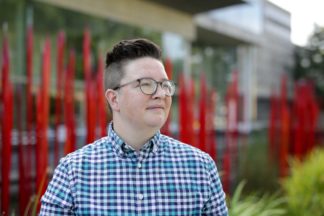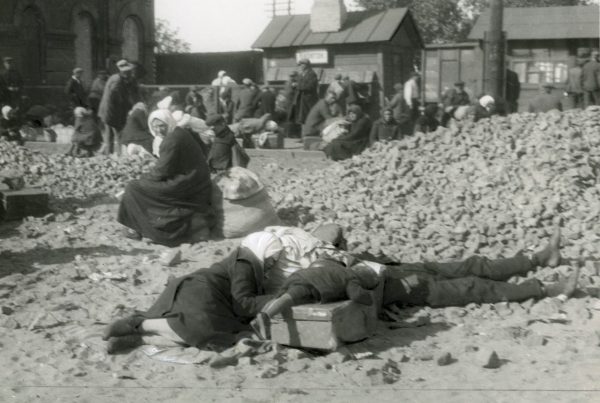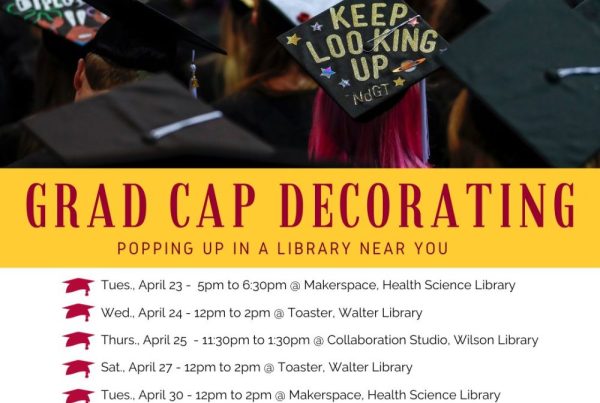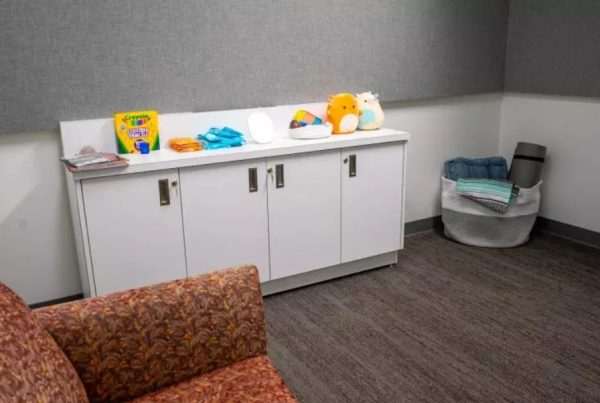The Tretter Collection in GLBT Studies at the University of Minnesota has just released the first 20 interviews from Phase Two of the Tretter Transgender Oral History Project (TTOHP).
Started in 2015 to document the diversity and breadth of transgender experiences, the Tretter Transgender Oral History Project entered this new phase with Oral Historian Myrl Beam, who came on board in July 2019.
“This second phase of the project is focused on trans activism,” says Beam, who has been involved with trans activism for many years and is a trans studies scholar. For the past year, he has been interviewing activists at the front lines of social change work focused on trans liberation. In a society in which too many trans people are murdered, he says, these are “people who are imagining a world that is not just safe . . . but a world in which trans people are valued.”
Overcoming barriers
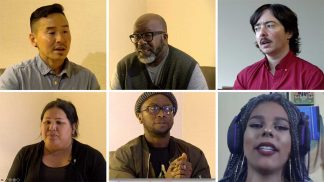 The activists featured in Phase Two of the TTOHP are working to overcome barriers that trans people experience in the areas of housing insecurity, police violence, health care, and other justice issues. They are spread out around the United States. By the time this second phase concludes in June 2021, Beam will have conducted a total of 60 interviews — all of which will be freely available on the Libraries’ UMedia digital collections website.
The activists featured in Phase Two of the TTOHP are working to overcome barriers that trans people experience in the areas of housing insecurity, police violence, health care, and other justice issues. They are spread out around the United States. By the time this second phase concludes in June 2021, Beam will have conducted a total of 60 interviews — all of which will be freely available on the Libraries’ UMedia digital collections website.
While about half the interviews he has conducted so far were done in person with Beam behind the video camera, with the onset of COVID, he also had to overcome the barriers imposed by shelter in place requirements — with Zoom, of course.
“I missed the energy,” he says, but the interviews were better than anticipated. And Beam can now interview people from all over the country. Of the Zoom interviews, he adds, “it’s a time capsule, documenting a moment.”
Recommended viewing
All of the newly available interviews are remarkable; but he says a great place to start is with three in particular: interviews with Black trans femme activists Diamond Stylz and LaSaia Wade, and immigrant justice advocate Ola Osaze.
Ola ”is an amazing storyteller and connects his own life experiences with the experiences of those who are detained.”
Beam also recommends watching for a new episode of the Tretter’s podcast “Transcripts” in January, focused on trans experiences in the South. “Transcripts” is a podcast intended to share the oral histories in a curated, bite-sized fashion with a broader community of listeners. You can listen to its first episode, which was released last June, on the “Transcripts” website.
New releases
The 20 newly released oral histories — videos and transcripts — from the Tretter Transgender Oral History Project can be browsed or searched online via the Libraries UMedia website. (The entire repository of interviews contained in the TTOHP collection is also available online.)
Interviewees include activists, organizational leaders, health-care providers, legal workers, grant-makers, members of the clergy, and others, according to a statement from the Tretter Collection in GLBT Studies, “working to build new, more fabulous worlds for trans people.”
Among these are interviews with:
- Erica Anderson (President of the U.S. Professional Association for Transgender Health; Berkeley, California)
- Carter Brown (Founder/Director of Black Transmen, Inc.; Dallas-Fort Worth, Texas)
- Sand Chang (psychotherapist, co-founder of The Gender Affirming Letter Access Project, and co-author of A Clinician’s Guide to Gender Affirming Care; Oakland, California)
- Ryan Li Dahlstrom (Program Officer for the Fund for Trans Generations at Borealis Philanthropy and formerly Executive Director of the Trans Youth Support Network; Minneapolis, Minnesota)
- Maddie Deutsch (Medical Director for Transgender Care at the University of California – San Francisco and President-Elect of USPATH, the US Professional Association for Transgender Health; San Francisco, California)
- Gabriel Foster (Executive Director of the Trans Justice Funding Project; Seattle, Washington)
- Kris Hayashi (Executive Director of the Transgender Law Center; Oakland, California)
- Aurora Higgs, (PhD candidate at Virginia Commonwealth University; Richmond, Virginia)
- Taffy Johnson (Executive Director of United Territories of Pacific Islanders Alliance; Seattle, Washington)
- Nathan Levitt (a nurse practitioner specialist in gender-affirming surgeries; Brooklyn, New York)
- Alexander Li-Hua Lee (Project Director of Grantmakers United for Trans Communities initiative; Oakland, California)
- Rickke Mananzala (Board Chair of Funders for LGBTQ Issues, New York City, New York)
- The Reverend Louis Mitchell (Co-Founder/Executive Director of TransFaith––a multi-tradition, multi-racial, multi-gender, multi-generational organization working to support transgender spiritual/cultural/energetic workers and their leadership in community; Seattle, Washington)
- Mariah Moore (National Organizer at Transgender Law Center and Co-director of House of Tulip; New Orleans, Louisiana)
- Zakia McKensey (Executive Director of Nationz Foundation, a Richmond, Virginia-based public health organization; Richmond, Virginia)
- Joey Mogul (attorney at the People’s Law Office and co-author of Queer (In)Justice: The Criminalization of LGBT People in the United States; Chicago, Illinois)
- Ola Osaze (Director of the Black LGBTQ+ Migrant Project; Houston, Texas)
- Dean Spade (Founder of the Sylvia Rivera Law Project, and author of the book Normal Life: Administrative Violence, Critical Trans Politics, and the Limits of Law, and, at the time of this interview; Seattle, Washington)
- Diamond Stylz (Founder and Executive Director of Black Trans Women, Inc., and creator of the podcast Marsha’s Plate; Houston, Texas)
- LaSaia Wade (Director of Brave Space Alliance, the first Black-led, trans-led LGBTQ center on the South Side; Chicago, Illinois), and
- Linda Wesp (family nurse practitioner and Certified HIV Specialist; Milwaukee Wisconsin)
Additional interviews will continue to be added to this collection in the coming months; stay tuned for future announcements.


